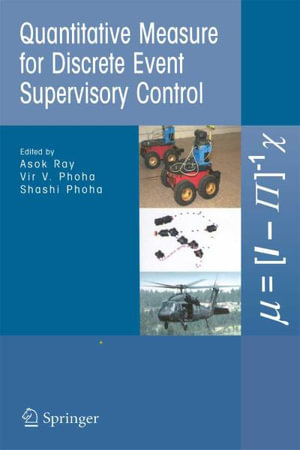
Quantitative Measure for Discrete Event Supervisory Control
By: Asok Ray, ?Vir V. Phoha, ?Shashi Phoha
eText | 21 June 2008 | Edition Number 1
At a Glance
eText
$159.01
or
Instant online reading in your Booktopia eTextbook Library *
Why choose an eTextbook?
Instant Access *
Purchase and read your book immediately
Read Aloud
Listen and follow along as Bookshelf reads to you
Study Tools
Built-in study tools like highlights and more
* eTextbooks are not downloadable to your eReader or an app and can be accessed via web browsers only. You must be connected to the internet and have no technical issues with your device or browser that could prevent the eTextbook from operating.
ISBN: 9780387239033
ISBN-10: 0387239030
Published: 21st June 2008
Format: PDF
Language: English
Publisher: Springer Nature
Edition Number: 1
You Can Find This eBook In
This product is categorised by
- Non-FictionComputing & I.T.Computer ScienceArtificial Intelligence
- Non-FictionComputing & I.T.Computer ScienceComputer Architecture & Logic Design
- Non-FictionComputing & I.T.Computer Networking & Communications
- Non-FictionComputing & I.T.Computer ScienceSystems Analysis & Design
- Non-FictionMathematics
- Non-FictionEngineering & TechnologyEnergy Technology & EngineeringElectrical Engineering
- Non-FictionEngineering & TechnologyMechanical Engineering & MaterialsMechanical Engineering
- Non-FictionEngineering & TechnologyElectronics & Communications EngineeringElectronics EngineeringAutomatic Control EngineeringRobotics
- Non-FictionComputing & I.T.DatabasesData Capture & Analysis
- Non-FictionComputing & I.T.Digital Lifestyle & Online World: Consumer & User GuidesPortable & Handheld Devices User Guides
- Non-FictionComputing & I.T.Computer Hardware
























